The Daily Bulletin is published by Internal and Leadership Communications, part of University Communications
Contact us at bulletin@uwaterloo.ca
Submission guidelines
Editor:
Brandon Sweet
University Communications
bulletin@uwaterloo.ca
A message from the Centre for Teaching Excellence.
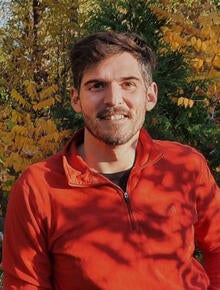 The Certificate in University Teaching (CUT) program provides a comprehensive teacher development experience that is open to PhD students at the University of Waterloo. Completion of the program is recognized by a certificate issued by Graduate Studies and Postdoctoral Affairs and listed on the participant’s transcript. Each year, the Centre for Teaching Excellence and Graduate Studies and Postdoctoral Affairs award one recent CUT program graduate in recognition and celebration of effort, reflection, and commitment to teaching development demonstrated during their participation in the program.
The Certificate in University Teaching (CUT) program provides a comprehensive teacher development experience that is open to PhD students at the University of Waterloo. Completion of the program is recognized by a certificate issued by Graduate Studies and Postdoctoral Affairs and listed on the participant’s transcript. Each year, the Centre for Teaching Excellence and Graduate Studies and Postdoctoral Affairs award one recent CUT program graduate in recognition and celebration of effort, reflection, and commitment to teaching development demonstrated during their participation in the program.
We are excited to announce that the 2022 CUT Award has been awarded to Tim Alamenciak, a PhD student in Social and Ecological Sustainability, in the Faculty of Environment. We spoke to Tim about his experience with the CUT program and his thoughts about teaching in a post-secondary environment.
My PhD research is investigating how to engage more people in ecological restoration. I am looking at what motivates volunteers to participate in ecological restoration, how to structure volunteer-based organizations to maximize engagement, and the use of ecological restoration as a convivial community tool through the case study of a native seed library.
Ecological restoration is a growing professional field. There are countless “non-professionals” who may not have gone to school for restoration, but still practice it. My research is focused on how people in that category can be engaged and supported, with the goal of increasing the openness of ecological restoration. I believe very strongly in knowledge sharing and accessibility. Everyone should have access to the knowledge and tools they need to restore ecosystems.
The United Nations declared this decade the UN Decade on Ecosystem Restoration (2021-2030), with the explicit goal of establishing a “culture of restoration.” We need to engage as many people as possible if we have any hope of achieving that goal.
What I find most interesting about my work is talking to people who are just getting started on the path. For example, they have just started planting native plants. I love hearing about what prompted them to make the shift and thinking about how we can get more people on board. I am committed and passionate about making restoration as open and accessible as possible.
The CUT program was such a wonderful experience, and the workshop was a great way to cap it off. I focused my research on inquiry-based learning (IBL) because it is a method with transformative learning outcomes. Students who engage in IBL internalize the lessons they experience and carry them forward into their working lives, rather than forgetting everything after the exam.
Reviewing the literature highlighted a familiar challenge: for IBL to be effective, it needs to be widely embraced. The term “scaffolding” is used to describe the practice of having first-year students start with basic forms of IBL and then guiding them towards more advanced forms. This means the whole department needs to embrace this approach and embed it in coursework for the students to be properly scaffolded. I designed the workshop with that goal in mind, hoping to appeal to as wide an audience as possible.
Read the full interview on the Centre for Teaching Excellence's website.
This article was originally featured on Waterloo News.
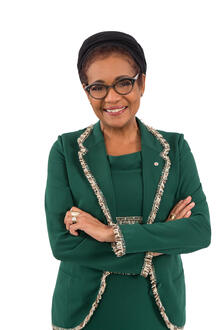 St. Paul’s University College at the University of Waterloo announced the creation of the Michaëlle Jean Scholars in International Development.
St. Paul’s University College at the University of Waterloo announced the creation of the Michaëlle Jean Scholars in International Development.
“I was sincerely moved by the announcement of the scholarship program created under my name,” said Madame Jean after the announcement. “I am very proud to be associated with a major award in support of the International Development program, which has special meaning for me.”
The International Development program provides students with the right knowledge and intercultural skills to create positive change in overseas communities where there are issues of economic inequality, social justice, and environmental degradation. The Michaëlle Jean scholars who choose to complete the 8-month overseas field placement will be matched with an international organization best suited to develop their particular passion for furthering sustainable development within selected geographical areas or communities.
“The students who choose to study at St. Paul’s share the same duty to make Canada and the world a more just place as the former governor general,” said St. Paul’s principal Richard Myers. “This award will help put them in a position to succeed, especially the unique eight-month field placement for fourth-year students.”
The program is a partnership between St. Paul’s and Waterloo’s School of Environment, Enterprise and Development (SEED). In it, SEED delivers two-thirds of the academic programming through its undergraduate degree in International Development (INDEV). St. Paul’s delivers the remainder, including the experiential learning placement or thesis project.
Madame Michaëlle Jean served as Canada’s Governor-General from 2005 to 2010 and joined St. Paul’s to serve as its chancellor from 2020 to 2024.
Beginning in 2023, St. Paul’s will designate three incoming International Development students as Michaëlle Jean scholars per year. They will hold the title for the duration of their enrollment in the program.
There will be a continuous cohort of 12 Michaëlle Jean scholars studying at any given time. Recipients will be provided with a bursary of $7,000 toward the cost of residence at St. Paul’s in their first year and an annual book allowance of $1,000 in each of the remaining years of their program. The Michaëlle Jean scholars will be expected to show leadership in the student INDEV community.
By Carol Truemner. This article was originally featured on Waterloo News.
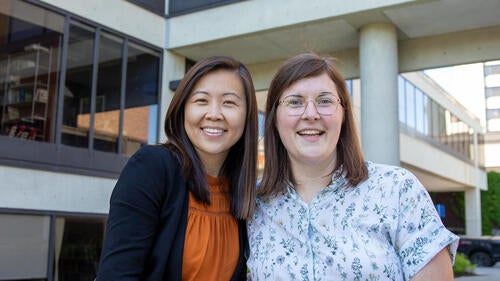
Michelle Liu, left, and Allie Kennington, right.
Looking back on their undergraduate years, Michelle Liu and Allie Kennington wish there had been more on-campus support and mentorship for them as 2SLGBTQ+ engineering students.
As alumni, Liu (BASc ’18 and MASc ’20, civil engineering) and Kennington (BASc ’19 and MASc ’22, geological engineering), are now providing their support through the Liu-Kennington Award for the 2SLGBTQ+ Engineering Community, the first of its type for this specific group offered at any Faculty of Engineering in Canada.
Launched last year, the $1,000 scholarship is awarded annually to an undergraduate student enrolled in year two, three or four in any Waterloo Engineering program.
Selection is based on positive contributions to the 2SLGBTQ+ community through extracurricular or volunteer involvement.
As an undergraduate student, Kennington found Liu to be welcoming in her advocacy efforts for equity-seeking groups by encouraging students to become involved with various initiatives.
“Michelle was eventually president of the departmental engineering undergraduate society and I was a class representative. She kept me on track by reminding me to come to meetings,” Kennington said. “It was her commitment to diversity and inclusion that ultimately brought us together.”
The couple is now living in Ottawa where Kennington is an environmental engineering specialist with SNC-Lavalin and Liu is pursuing both a law degree (JD) and an engineering PhD at the University of Ottawa.
Liu’s doctoral research is focused on highlighting the opportunities and challenges facing the engineering profession in addressing its urgent need for cultural change, a topic that earned her the Pierre Elliott Trudeau Foundation Scholarship and a Natural Sciences and Engineering Research Council (NSERC) Scholarship.
Still connected to Waterloo Engineering, Liu is the inaugural chair of the Recent Engineering Alumni Council (REAC), which represents more than 20,000 graduates from the last 10 years.
Both Liu and Kennington regularly volunteer at Waterloo Engineering recruitment events and recently led the first-ever 2SLGBTQ+ breakout room for prospective Waterloo Engineering students at a Women in Engineering hangout.

Allie Kennington, left, and Michelle Liu, centre, with Lieutenant Governor of Ontario Elizabeth Dowdeswell at at a Canada Foundation for Innovation event in Ottawa.
It’s important for Liu and Kennington to change how they and others who identify as 2SLGBTQ+ are viewed and treated outside as well as inside the workplace.
“Engineers often respond to our 2SLGBTQ+ identities with ‘what you do in your spare time doesn’t matter at work’, and that is precisely the kind of marginalization that we need to move away from,” they said about their own experiences.
Imagine coming to work on Monday and everyone is talking about what they did with their partners and family over the weekend, but you are too uncomfortable or scared to share who you spent your weekend with.”
Last year, Liu and Kennington described the introduction of a Waterloo Engineering role focused on diversity and inclusion as a turning point for the University’s 2SLGBTQ+ engineering community.
Mary Robinson (BASc '02 and MASc '10, chemical engineering), who in 2021 was appointed the first associate dean of outreach, equity and diversity, reached out to Liu to discuss diversity and inclusion in Waterloo Engineering, subjects they had previously chatted about when Liu was an undergraduate student.
In her role, Robinson said she wants to make sure Waterloo Engineering “is a place where people never need to feel they have to check a part of who they are at the door.”
“My goal is to bring together the pockets of diversity, equity, inclusion and Indigenization activity happening around the Faculty to create an environment where everyone, including all faculty, staff and students, can be their full authentic selves,” she said.
Liu intends to remind members of the engineering community that their work is an applied science and each engineer brings their own perspectives and biases in applying this science.
“I want to use the milestones I have reached to empower other equity-seeking engineering students to blaze their own path toward change,” Liu said.
There are a number of programs and clubs specific to supporting diversity and equity in Waterloo Engineering including Women in Engineering, EngiQueers, the Canadian branch of the American Indian Science and Engineering Society and the University’s chapter of a national organization of Black engineering students and professionals.
Earlier this year, William Woodworth, also known as Elder Bill, was appointed Elder in Residence for the Faculty. Engineering students, staff and faculty are welcome to book a remote or in-person appointment with Elder Bill.
Across campus, there are also a number of support groups and services for students with diverse backgrounds, abilities, and interests.
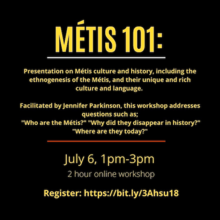 The Office of Indigenous Relations is hosting an online workshop this week entitled Métis 101, a presentation on Métis culture and history. Facilitating the online workshop is Jennifer Parkinson, who was elected as President of Grand River Métis Council, Métis Nation of Ontario in 2014. Jennifer started on Council in 2011 as the interim Chair, then elected to the Chair position in 2012. Since 2010, Jennifer has expanded and shared her knowledge with thousands of children each year by going into schools, colleges and universities. Today, Jennifer is very active politically, meeting with various proponents, government officials and government ministries, all in the pursuit of solidifying Métis citizens’ rights in Canada. Jennifer continues to enjoy her journey and support the Métis Nation.
The Office of Indigenous Relations is hosting an online workshop this week entitled Métis 101, a presentation on Métis culture and history. Facilitating the online workshop is Jennifer Parkinson, who was elected as President of Grand River Métis Council, Métis Nation of Ontario in 2014. Jennifer started on Council in 2011 as the interim Chair, then elected to the Chair position in 2012. Since 2010, Jennifer has expanded and shared her knowledge with thousands of children each year by going into schools, colleges and universities. Today, Jennifer is very active politically, meeting with various proponents, government officials and government ministries, all in the pursuit of solidifying Métis citizens’ rights in Canada. Jennifer continues to enjoy her journey and support the Métis Nation.
Register now for the online, two-hour workshop that takes place Wednesday, July 6.
The Writing and Communication Centre (WCC) has shared the following announcements:
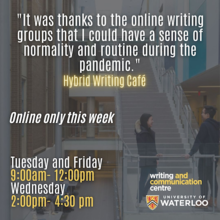 Hybrid Writing Cafés: "Please note that our Hybrid Writing Café will be online-only the week of July 5 to 8," says a note from the WCC. "Join your peers and write together at the hybrid writing cafés on Tuesday and Friday from 9:00 a.m. to 12:00 noon and Wednesday from 2:00 p.m. to 4:30 p.m. on LEARN.
Hybrid Writing Cafés: "Please note that our Hybrid Writing Café will be online-only the week of July 5 to 8," says a note from the WCC. "Join your peers and write together at the hybrid writing cafés on Tuesday and Friday from 9:00 a.m. to 12:00 noon and Wednesday from 2:00 p.m. to 4:30 p.m. on LEARN.
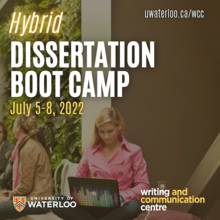 Dissertation Boot Camp: "Dissertation Boot Camp starts this week," says a note from the WCC. "Make progress on your thesis or dissertation in a supportive community."
Dissertation Boot Camp: "Dissertation Boot Camp starts this week," says a note from the WCC. "Make progress on your thesis or dissertation in a supportive community."
More human than human: Blade Runner at 40
Students can visit the Student Success Office online for supports including academic development, international student resources, immigration consulting, leadership development, exchange and study abroad, and opportunities to get involved.
Instructors looking for targeted support for developing online components for blended learning courses, transitioning remote to fully online courses, revising current online courses, and more please visit Agile Development | Centre for Extended Learning | University of Waterloo (uwaterloo.ca).
Instructors can visit the Keep Learning website to get support on adapting their teaching and learning plans for an online environment.
Course templates are available within your course in LEARN to help you build and edit your content and assignment pages quickly.
The following workshops, webinars, and events are offered by the KL team (CTE, CEL, ITMS, LIB):
Scholarship of Teaching and Learning (SoTL) Methods – self-directed, continuous self-enrollment course in LEARN.
Independent Blended Course Design (iBlend) - self-directed, continuous self-enrollment course in LEARN.
Copyright Overview for Waterloo Instructors and Staff - self-directed, continuous self-enrollment course in LEARN.
Independent Remote Course Design Essentials (iReCoDE) - self-directed, continuous self-enrollment course in LEARN.
Supporting Student Mental Health (for Instructors) – self-directed, continuous self-enrollment course in LEARN.
NEW - WAI Inspired Wednesdays: Enabling the uptake of feedback (CTE7010) – July 13, 10:00 a.m. to 12:00 noon
NEW - SoTL Stories – July 13, 1:00 p.m. to 2:00 p.m.
NEW - WAI Inspired Wednesdays: Redesigning Assignments from a Remote Offering to a Flipped Course (CTE7010) – July 20, 10:00 a.m. to 12:00 noon.
Supports are available for employees returning to campus. Visit IST’s Hybrid Work and Technology guidelines and workplace protocols to assist with the transition.
The Writing and Communication Centre has in-person and virtual services to support grad and undergrad students, postdocs and faculty with any writing or communication project. Services include one-to-one appointments, drop-ins at Dana Porter Library, online workshops, writing groups, English conversation practice, and custom in-class workshops.
Co-op students can get help finding a job and find supports to successfully work remotely, develop new skills, access wellness and career information, and contact a co-op or career advisor.
The Centre for Career Action (CCA) has services and programs to support undergrads, grad students, postdocs, alumni, and employees in figuring out what they value, what they’re good at, and how to access meaningful work, co-op, volunteer, or graduate/professional school opportunities. Questions about CCA's services? Live chat, call 519-888-4047, or stop by our front desk in the Tatham Centre 8:30 a.m. to 4:30 p.m., Monday to Friday.
Drop-in to Warrior Virtual Study Halls on Wednesdays from 5:30 p.m. to 7:00 p.m. Come together in this virtual space to set goals and work independently or in groups each week.
Renison's English Language Institute continues to offer virtual events and workshops to help students practice their English language skills.
If you feel overwhelmed or anxious and need to talk to somebody, please contact the University’s Campus Wellness services, either Health Services or Counselling Services. You can also contact the University's Centre for Mental Health Research and Treatment. Good2Talk is a post-secondary student helpline available to all students.
The Library is open with expanded hours for access to book stacks, drop-in individual study space, bookable group study rooms, drop-in access to computers and printers, book pick-up services and IST Help Desk support. Librarian consultations, Special Collections & Archives and the Geospatial Centre are available by appointment. Full details on current services and hours are available on the Library’s COVID-19 Update webpage.
The Faculty Association of the University of Waterloo (FAUW) continues to advocate for its members. Check out the FAUW blog for more information.
The University of Waterloo Staff Association (UWSA) continues to advocate for its members. Check out the UWSA blog for more information.
The Sexual Violence Prevention and Response Office (SVPRO) supports all members of the University of Waterloo campus community who have experienced, or been impacted, by sexual violence. This includes all students, staff, faculty and visitors on the main campus, the satellite campuses, and at the affiliated and federated Waterloo Institutes and Colleges. For support, email: svpro@uwaterloo.ca or visit the SVPRO website.
The Office of Indigenous Relations is a central hub that provides guidance, support, and resources to all Indigenous and non-Indigenous campus community members and oversees the University's Indigenization strategy.
The Waterloo Indigenous Student Centre, based at St. Paul’s University College, provides support and resources for Indigenous students, and educational outreach programs for the broader community, including lectures, and events.
WUSA supports for students:
Peer support - MATES, Glow Centre, RAISE, Women’s Centre - Visit https://wusa.ca/services/wusa-peer-support to book an appointment either in person or online for the Fall term.
Food Support Service food hampers are currently available from the Turnkey Desk 24/7 in the Student Life Centre. Drop off locations are also open again in SLC, DC, DP, SCH and all residences.
Co-op Connection all available online. Check https://wusa.ca for more details.
Centre for Academic Policy Support - CAPS is here to assist Waterloo undergraduates throughout their experience in navigating academic policy in the instances of filing petitions, grievances and appeals. Please contact them at caps@wusa.ca. More information is available.
WUSA Student Legal Protection Program - Seeking legal counsel can be intimidating, especially if it’s your first time facing a legal issue. The legal assistance helpline provides quick access to legal advice in any area of law, including criminal. Just call 1-833-202-4571.
Empower Me is a confidential mental health and wellness service that connects students with qualified counsellors 24/7. They can be reached at 1-833-628-5589.
GSA-UW supports for graduate students:
The Graduate Student Association (GSA-UW) supports students’ academic and social experience and promotes their well-being.
Advising and Support - The GSA advises graduate students experiencing challenges and can help with navigating university policies & filing a grievance, appeal, or petition.
Mental Health covered by the Health Plan - The GSA Health Plan now has an 80 per cent coverage rate (up to $800/year) for Mental Health Practitioners. Your plan includes coverage for psychologists, registered social workers, psychotherapists, and clinical counselors.
Dental Care - The GSA Dental Plan covers 60 to 70 per cent of your dental costs and by visiting dental professionals who are members of the Studentcare Networks, you can receive an additional 20 to 30 per cent coverage.
Student Legal Protection Program - Your GSA fees give you access to unlimited legal advice, accessible via a toll-free helpline: +1-833-202-4571. This advice covers topics including housing disputes, employment disputes, and disputes with an academic institution.
The Graduate House: Open Monday to Tuesday 11:30 a.m. to 7:00 p.m. and Wednesday to Friday 11:30 a.m. to 9:00 p.m. We’re open to all students, faculty, staff, and community members. The Graduate House is a community space run by the GSA-UW. We’re adding new items to the menu. Graduate students who paid their fees can get discounts and free coffee.
Warriors vs. Laurier Blood Donation Battle. Join our “Waterloo Warriors” team on the Blood.ca website or app. #ItsInYouToGive
Warriors Custom Apparel Program June 22 to July 13. Purchase customized team specific gear to get ready for the 2022-2023 season. Hoodies, Hats, Jerseys, T-shirts and more.
Warriors Youth Summer Day Camps, July 4 to September 2. Open to boys and girls age 5-18. Baseball, Basketball, Football, Hockey, Multi-Sport and Games & Volleyball. Register today.
NEW - Métis 101, Wednesday, July 6, 1:00 p.m. to 3:00 p.m.
Valuation of water quality in Canada: An overview of the upcoming policy needs and challenges, presented by Jean-Michel Larivière, Environment and Climate Change Canada. Part of the Water Institute's webinar series: The Value of Water in Canada. Wednesday, July 6, 12:00 p.m.
WISE Workshop, “Introduction to Feedback-Based Optimization and Applications to Energy Systems” by Daniel Eduardo Olivares Quero, Monday, July 11, 9:00 a.m. to 4:00 p.m., In-person at Evolv1 Classroom.
The Daily Bulletin is published by Internal and Leadership Communications, part of University Communications
Contact us at bulletin@uwaterloo.ca
Submission guidelines
The University of Waterloo acknowledges that much of our work takes place on the traditional territory of the Neutral, Anishinaabeg, and Haudenosaunee peoples. Our main campus is situated on the Haldimand Tract, the land granted to the Six Nations that includes six miles on each side of the Grand River. Our active work toward reconciliation takes place across our campuses through research, learning, teaching, and community building, and is co-ordinated within the Office of Indigenous Relations.